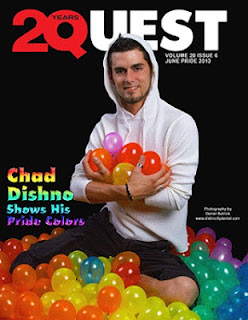by David Webb
Staff size and breakdown: 1 staff photographer (part-time); 4 freelance photographers (part-time); 1 feature writer (part-time); 3 columnists (part-time) and 1 graphic design/layout/bookkeeping (full-time)
Physical dimensions of publication: 8½” x 11” full-color coated stock
Average page count: 28 pages
Area of coverage: Wisconsin including Madison, Milwaukee, Racine, Kenosha, Green Bay and Fox Cities
Key demographics for readers: 75% male, 25% female; Average age around 30
Website address: www.quest-online.com
*****
PPQ: When did you launch your publication, and what inspired you to do it?
Publisher Mark Mariucci: February 1993. At that time, I owned a large dance club in Green Bay. The main LGBT media publication was called In Step and mostly covered Milwaukee where it was based. I hoped to level the playing field a bit by publishing a cheaper publication that small bars in little cities could afford and also give them, along with my bar, more coverage of events. We always distributed in Milwaukee, but we also were in every city that had at least one gay bar back then.
PPQ: What if anything distinguishes your publication from other LGBT newspapers, magazines and online publications, and how much competition is there in your area for LGBT-specific news and advertising?
Mariucci: Quest evolved over the years from an events calendar into a full-fledged newsmagazine when we found ourselves the only one still publishing. However today, we mainly focus on arts, entertainment, photography and lifestyle. We now compete with two other publications: Wisconsin Gazette, a Milwaukee-based newspaper that covers local and national news, and Our Lives from Madison, which has a similar glossy format to Quest but is more focused on telling people’s stories. Quest differs from the other two in that we are less politically correct. We attempt to highlight the diverse crosssection of the LGBT lifestyle in both words and our photography. Many of the businesses that could advertise with us are put off when they see anything remotely sexual on our pages, such as a man in a bar with his shirt off or wearing leather attire, or the drag community which we are particularly fond of. Quest does not shy away from showing this side of our community, but that scares away advertisers in our market.
PPQ: What were your greatest challenges in getting it up and running?
Mariucci: Quest was started back when many other publications were still doing wax paste-up. We began using Quark Xpress for digital publishing from the start. There are always growing pains when you are learning to use what at the time was cutting edge new technology. We were unknown from a small market, so getting advertisers to embrace us was the biggest challenge.
PPQ: Is it successful now and how do you gauge that?
Mariucci: We have most of the advertising market that is LGBT-owned including bars, restaurants and other small businesses. Our ad prices are very low, so we have to be extremely frugal. Although I would not say Quest is financially rewarding, we do have the love and respect of a large segment of the LGBT community. We have touched many lives over the years, and I feel our work is important.
PPQ: Have you experienced significant changes in publication size, and when did you see that occurring?
Mariucci: We started our as a booklet-sized 5½” x 8” publication in newsprint but bound into a book. Within our first year, we acquired presses and started printing in a larger 7” x 8.5” format similar to what Homo Xtra in New York was doing then. In 2007, we started having our printing done for us again so we could move to more color. Two years ago, we went all color on glossy paper which was much more expensive, but the results were worth it, especially for our advertisers.
PPQ: Are you facing new challenges and what are they?
Mariucci: Our print run is half of what we used to do, and we have fewer pages as well. Advertising dollars have not grown, plus we have seen the number of LGBT businesses in our state decrease. More people are turning to online resources, replacing some of what we used to publish. Things like event calendars and classifieds have migrated to Facebook and Craigslist, for example. News is often more timely when read online. We have changed what we publish as a result of these changes.
PPQ: What’s the most surprising feedback you’ve received from a reader?
Mariucci: I think it is the lack of negative feedback that surprised me most. There has been only one or two people voice critical comments over the years.
PPQ: What advice do you have for others working in the LGBT media?
Mariucci: Try to work alongside the other publications around you to be different and not just repeat what is already being done elsewhere. Find a way to be able to move to the web when print is no longer viable. For a small entity like Quest, that is our greatest challenge going forward.
Volume 15
Issue 3
PRESSING QUESTIONS







